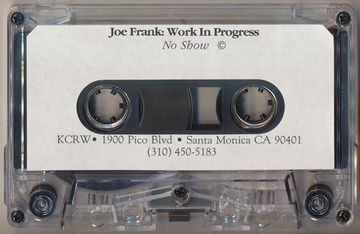No Show: Difference between revisions
From The Joe Frank Wiki
m →Music: formatting Tags: Mobile edit Mobile web edit |
m airdate |
||
| Line 48: | Line 48: | ||
[[Category:Serious_Monologue]] | [[Category:Serious_Monologue]] | ||
[[Category:1986]] | [[Category:1986]] | ||
[[Category: Work In Progress]] | [[Category:Work In Progress]] | ||
[[Category:Unknown_air_date]][[Category:Show]][[Category:Show_by_date| | [[Category:Unknown_air_date]] | ||
[[Category:Show]] | |||
[[Category:Show_by_date|19860008]] {{Airdate|airdate=1986}} | |||
Revision as of 14:48, 9 March 2021
 | |
| Series | |
|---|---|
| Work In Progress | |
| Original Broadcast Date | |
| 1986 | |
| Cast | |
| Joe Frank | |
| Format | |
| Serious Monologue, 60 mins / 90 mins / 120 mins | |
| Preceded by: | Landing Strip In The Jungle, A |
| Followed by: | Let Me Not Dream |
I have an announcement to make this evening. There is no show.
No Show is a program Joe Frank produced as part of the series Work In Progress. It was originally broadcast in 1986.
Synopsis
- Joe announces that there is no show, and spends the program explaining why against soft piano music.
- Discussing the inter-connectedness of all things and the indomitable desire to live with a producer.
- Joe sweeps a tuner across commercial radio stations, suggests his audience listen to something else
- A woman invites herself to Joe's apartment, talks forever about nothing, and harasses his cat. Sharing a frozen dinner with an elderly cat.
- Joe calls a telephone counseling line from the studio.
- A dinner party in Joe's honor, feeling a fraud, discussing the meaning of quality of life. Dinner parties as an Olympic sport.
- The lawsuit against a film company for plagiarism.
- Joe's friend talks about problems with his mother.
- Joe's cat goes into a seizure.
- Living in a noisy neighborhood. Waking up to a film crew outside.
- Joe picks up a girlfriend at the airport.
Music
- "My First Homage" - Gavin Bryars (from Hommages, 1981) | YouTube
Miscellanea
- Although broadcast frequently in a 60-minute edit, there are 90-minute and 120-minute versions.
- Joe's most truly autobiographical show. 100% true, *probably*. He talks about his daily life and frustrations, and the cumulative interruptions which have caused him to be unprepared to write a show.
- Joe's most "improvised" monologue. You hear him tell unprepared stories about his life, his narrative is less polished, more hesitant, sounds like his "true speaking voice".
- Includes material about his lawsuit against the screenwriter from the Scorcese film "After Hours", which is not included in the 60-minute version.
